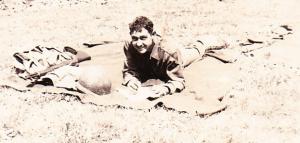Wounded WW II veteran John Heard had a unique rehab assignment - play Augusta National

PGA.COM April 8, 2013 4:29 PM

.
View gallery
John Heard, a member of the 308th Engineering Combat Battalion assigned to the 8th Army at the Battle …
Tom Heard had never heard his father, John, talk about golf, and he had never seen him play. John was a farmer and poultry inspector in rural Georgia, and he spoke occasionally about his days playing baseball. But golf never came up.
Then in 1975 Tom and his brother sat in the living room to watch an epic final round of the Masters as Jack Nicklaus won over Tom Weiskopf and Johnny Miller. As the CBS cameras showed panorama shots of the 13th hole with azaleas and dogwoods in full bloom, Tom said, "Wow that is beautiful."
He was shocked when his father said, "Yeah, that is a pretty place, but it's a tough hole."
The boys looked at their father and asked, "You've been to Augusta National?"
John said, "Sure. I played it every day I was there."
Tom said, "I never knew you played golf."
His father said, "I don't. Augusta National's the only place I ever played."
The fact that John Heard played the only golf of his life at Augusta National, not once but numerous times, came as almost a big a shock to his sons as the fact that he had never mentioned it before. But men of that generation kept a lot of things locked away. More often than not, it was for good reason.
John Heard was with the 308th Engineering Combat Battalion assigned to the 8th Army at the Battle of the Bulge in the winter of 1944. On a snowy December morning, a member of their unit tripped a large German mine buried in the French countryside. An entire squad was blown to bits. John was the only survivor.
With shrapnel in his shoulder, back and hip, he was medically evacuated to Paris, and then flown to England for several weeks. When he was strong enough to travel, John returned stateside on the Queen Mary, and was transported by train to the Army's Camp Gordon Hospital in Augusta for rehab.
Physical therapy wasn't much of a science in the 1940s, so John's rehab consisted of whatever calisthenics he could do, followed by golf in the afternoon at a local club, Augusta National, which opened its doors to wounded veterans.
John played the National almost every day for six months. He had never played the game before and never played it after. Like most parts of the war, he put that piece of his life away never to be visited again.
Those who knew Bob Jones and Clifford Roberts personally would not be surprised by John's story. Roberts discovered Augusta and the old Berckman's Nursery during his time in the Army at Camp Gordon (now Fort Gordon), and Bob Jones was a captain in the Army Air Corp and landed in Normandy on D-Day plus one.
For years Roberts and Jones allowed any uniformed serviceman free admittance to the grounds for the tournament. That was how Arnie's Army got its name. And for decades the club provided aid and support to military families in the area.
But Augusta National members kept quiet about the good deeds they did for wounded heroes like John Heard, just as they remain silent to this day on matters big and small. You won't hear anyone at the National speak about the extraordinary charity work the club does, not just in Augusta but throughout the country, nor will the men in green jackets utter a peep about their ongoing support for wounded veterans and their families.
The best charity is always the quietest. That is something to remember when the lazy criticisms of Augusta National are trotted about again this year. The privacy they so jealously protect does not conceal some nefarious conspiracy.
Sometimes, as in the story of John Heard and the wounded heroes of World War II, it is for the good.
No comments:
Post a Comment